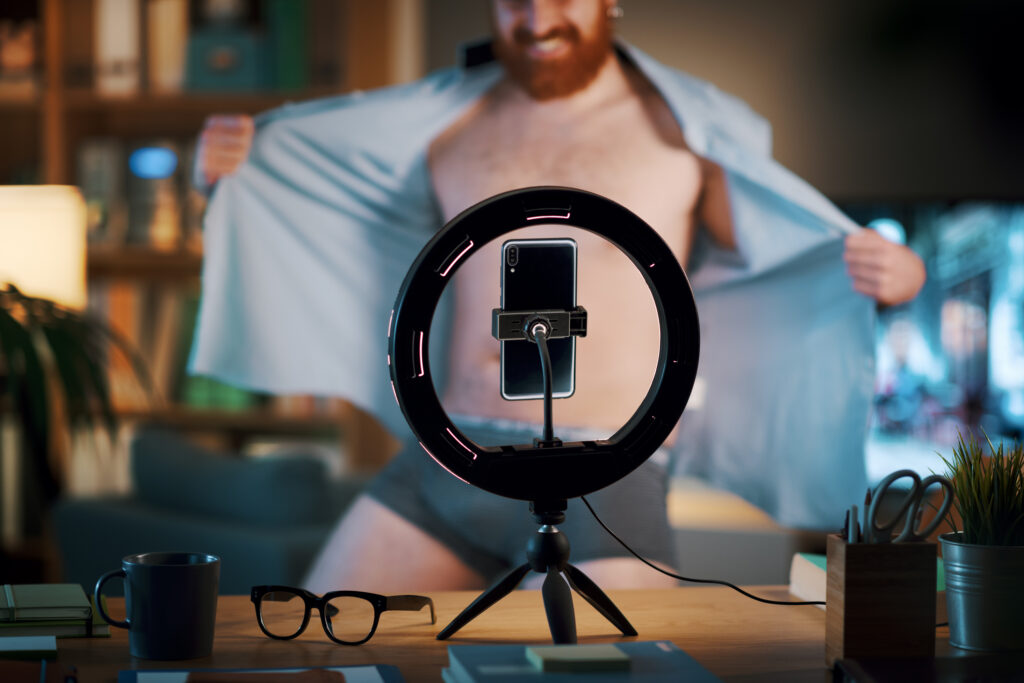He’s a regular. Always polite and always tips. Once, he even logged in just to say goodnight.
She smiles when his username pops up. He’s easy to talk to and keeps it fun. He asks about her dog and never gets weird. But still, when the stream ends and she’s washing her makeup off, the thought crosses her mind: “Why does he need this? Why doesn’t he just date?”
It’s not judgment, just curiosity.
As it turns out, she’s not the only one asking.
In their latest research, the Kinsey Institute delves into what camsite users (models and members) believe society thinks about them. And what they think about each other.
If you’ve been following this research team’s previous work (and we have), you know they’ve already examined how camming is redefining consent, digital intimacy, and yes, emotional connection.
This new study, “Understanding stigmatization in digital sex work: Perceptions of camsite
members and models”, gets real about stigma—from the inside out.
Because society’s beliefs may not match reality.

Ctrl+Alt+Stigma
Digital sex has become more mainstream, but the stigma? It’s still there. While folks are getting more comfortable swiping, clicking, and camming, many still hold strong opinions about those who pay and perform.
To explain this, researchers use Sexual Scripts Theory. This framework poses that there are unwritten rules that tell us who should do what, when, and with whom in a sexual setting. We often learn these scripts from culture, family, and media.
“In Western cultures, the dominant cultural sexual script traditionally centers around in-person, non-transactional sexual activity between romantic partners.” In 2025, that’s a pretty narrow view, not to say outdated.
Tech has changed things, especially within our intimate lives. From AI chatbots to streaming porn, dating apps, interactive sex toys, and camming platforms, many of our desires are built, explored, and maintained online. And for some, it’s even how they learn about sex (hello ChatGPT sex education). For others, it’s how they feel connected or access sexuality. We could say, the internet isn’t simply where we meet romantic situationships, it’s where we’re shaping our sexual selves.
But not all digital intimacy fits those sexual scripts mentioned above.
Online sexual interactions (like camming) don’t follow these traditional ideas. They’re transactional. They’re not about kids, love, or long-term relationships. And that can make society uncomfortable.
From the oldest to the newest profession
Sex work isn’t new. But it’s still stigmatized.
Globally, sex work gets associated with “criminality, exploitation, moral deviance, and public health threats.” Since most sex workers are women, society layers on ideas about “sexual purity” and judgment, and it’s not just the workers. Members get the side-eye, too. They’re seen as “sexually exploitive,” “socially and sexually inadequate,” and are often unfairly linked to contributing to sex trafficking.
Enter digital sex work.
It’s safer than its street-based counterpart. It’s online, so there’s less risk of physical harm. Camming sites such as LiveJasmin, offer everything from private erotic shows to social chats. People go for entertainment. But many also seek emotional connection, even relationship skills.
The Study
Margaret Bennet-Brown, Ph.D., and colleagues surveyed 744 adult camsite members (mostly men) and 320 models (mostly women) from LiveJasmin. They wanted to know what the participants thought society thinks of them compared to what they think about each other (cam models and members).
They asked about ten common stereotypes: five sexual (like addiction, shame, deviance) and five socioemotional (like poor social skills or bad relationships).
The research team aimed to explore “the extent to which camsite members and models feel that negative stereotypes are accurate or applicable.”
Stigma is real, but perceptions might be more nuanced, especially when you ask the folks actually living it.

Camming models and members speak up
A big chunk of both groups (60% of members and 62% of models) thought that society sees camsite members as addicted to sex. And about half of them say that society believes that the members are deviant and immoral. Over 50% of cam models and members agree that society views camming members as having poor social skills, being emotionally immature, and incapable of forming IRL relationships.
And the societal views on webcam models? Similar.
Nearly 50% of models said they believe society perceives them as sexually immoral, and around 44% of members agreed. More than a third of both groups thought that society assumes models are emotionally immature, unable to form in-person intimate relationships, or have poor relationships with their family.
But does it match what cam models and members think about each other?
How camsite members view models
Members push back. They don’t agree with society. Only 26% of them believe webcam models are addicted to sex. Just 19% thought they were sexually immoral. And even fewer thought the models were emotionally immature or unable to build IRL romantic relationships.
This matters.
It tells us that firsthand experience inside camming platforms (like LiveJasmin) challenges stigma. When folks get to know the cam models (even through a screen), they’re less likely to believe those old, tired tropes. This supports what the researchers call Contact Theory: the idea that close or repeated contact with a marginalized group can reduce bias.
And it’s not just about pushing back on stereotypes directed at the models; they’re rejecting the narrative of camming. Many members don’t believe they are doing something immoral or shameful. This may suggest a change in how society views all digital intimacy—less about a dysfunction in a person and more about the autonomy and the choice to do intimacy in a way that works for you.
How models view camsite members
The models were more likely to believe negative stereotypes about the members. 68% of them thought the camsite members are addicted to sex. 53% claimed the members are emotionally immature, and 54% believe they are unable to have offline romantic relationships.
This may be partly due to the fact that models interact with larger numbers of members compared to the number of models the members are engaging with. Some of those interactions are positive, but many may not be. Over time, this frequent exposure to emotionally intense or questionable behavior could lead webcam models to form some generalized opinions.
It is also possible that some members are simply struggling. Models are thus interacting with folks who are seeking intimacy, relief, escape, and validation, highlighting the importance of digital space for sexual coping and fulfillment.
Despite potentially heavy emotional demands, camming models maintain boundaries, manage the tone of their member interactions, and try to create a safe space for the members to get what they want from a camming platform.
Whether that be connection, companionship, or fulfilling their deepest desires.
Less judgment, more understanding
The Kinsey Institute is proving that behind every stereotype is a real-life human trying to feel seen, safe, and connected. Camsites may be among the few spaces where folks feel free to explore who they are. As such, they are ideal space for both enjoyment and interventions.
Yes, there’s still stigma. But the gap between what society believes and what participants feel is where actual change can occur.
Of course, this study isn’t without its limits. It employed self-report measures, and since participants opted in, they were more likely to be comfortable discussing the topics.
Still, the study’s results lay the groundwork for more research. Future studies could explore how camming is experienced across a larger spectrum of identities, sexualities, and lived experiences. The authors suggest using these findings to promote stronger workplace protections, expand mental health resources, and push against fear-mongering the public.
This isn’t merely about understanding stigma; it’s about undoing it.
Because if we stop assuming and start listening, we might shift the narrative around online sex work.




